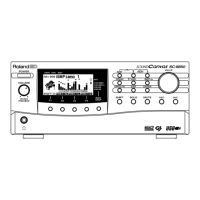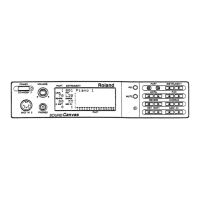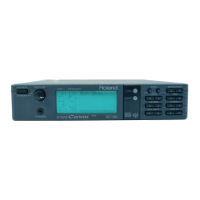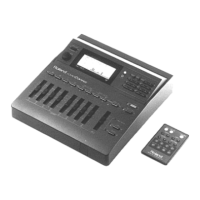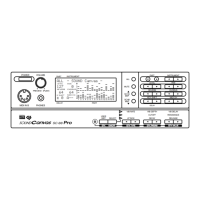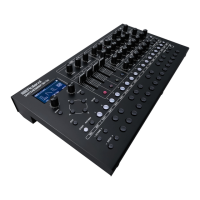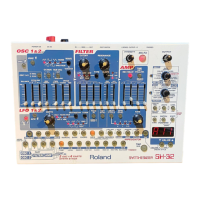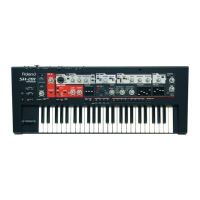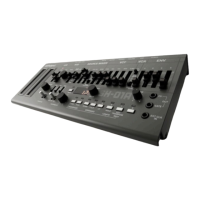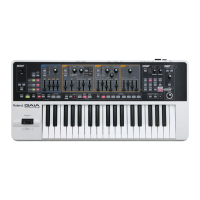Do you have a question about the Roland Sound Canvas SC-88 VL and is the answer not in the manual?
| Polyphony | 64 voices |
|---|---|
| MIDI | In, Out, Thru |
| Release Year | 1996 |
| MIDI Channels | 32 |
| Effects | Reverb, Chorus, Delay, EQ |
| Type | Desktop Sound Module |
| Outputs | Stereo (L/Mono, R) |
| Headphone Output | Yes |
| Parts | 32 parts (16 internal + 16 external) |
Overview of the SC-88VL's key capabilities, including General MIDI and GS format compatibility.
Explanation of the General MIDI standard for sound generation devices and music data.
Details on Roland's GS format specifications for standardizing MIDI capabilities.
Guidelines for safe and proper use of the AC adaptor and power connection.
Recommendations for placing the unit to avoid damage and ensure optimal performance.
Procedures for cleaning the unit to prevent damage and deformation.
Safety advice regarding impact, liquid penetration, and handling the unit.
Information about the battery backup for memory and recommended replacement intervals.
Explanation of how parameters are displayed and buttons are indicated in the manual.
Step-by-step guide to connect a MIDI keyboard and produce sound.
Troubleshooting steps to verify MIDI message reception and sound output.
Instructions on how to select instruments and sound maps to try out different sounds.
Guide to operating volume, pan, and key shift functions using front panel buttons.
Overview of how to adjust reverb, chorus, and delay effects for the sound.
Procedure for adjusting the Master Tune setting to match external instruments.
Information on connecting and using headphones with the audio output jacks.
Details on connecting external sound sources to the audio input jacks.
Explanation of Parts, Timbres, Instruments, and Part Modes (Normal/Drum).
Procedure for selecting instruments for each of the 32 Parts.
Guide on how to choose between Capital and Variation sounds within sound maps.
Understanding how instrument and variation numbers are displayed and used.
Explanation of MIDI channels assigned to each Part and how they relate to ensembles.
How simultaneous note counts and voice allocation affect sound playback.
Parameters that determine how each Part responds to MIDI messages.
Adjusting sound parameters like Vibrato, Filter, and Envelope for unique sounds.
Detailed explanation of individual part parameters like Level, Pan, Key Shift, Mute, etc.
Introduction to reverb, chorus, delay effects, and the two-band equalizer.
Procedure to adjust reverb, chorus, and delay levels for all parts simultaneously.
Procedure to adjust reverb, chorus, and delay levels for individual parts.
How to set master reverb, chorus, and delay parameters common to all parts.
Detailed explanation of Reverb Character, Level, Time, and other related parameters.
Detailed explanation of Chorus parameters like Rate, Depth, Level, and Feedback.
Detailed explanation of Delay parameters including Time, Level, Feedback, and Send levels.
Diagrams illustrating the signal flow for effects in Single and Double Module modes.
Procedure for performing a Bulk Dump to save all unit settings as MIDI data.
How to set the SC-88VL to the sound map of the Roland CM-64.
Comparison of sound characteristics, exclusive data, and pan settings.
Explanation of Single Module Mode and Double Module Mode operations.
Procedure to switch the unit to Double Module Mode for simultaneous effects.
How to initialize all parts to factory settings or for General MIDI/GS.
Procedure to input and save a custom message displayed on the SC-88VL.
How to input and save custom messages for the SC-88VL display.
Methods for connecting the SC-88VL to a computer via MIDI or COMPUTER connectors.
Instructions for connecting the SC-88VL to a computer using MIDI interface adapters.
How MIDI data flows between the SC-88VL and computer based on switch settings.
How to connect external sound sources to the SC-88VL's MIDI OUT/THRU.
How to remotely select instruments using MIDI keyboard or sequencer messages.
How to select Drum Sets using MIDI Program Change messages.
Explanation of exclusive data addresses for receiving and transmitting data.
Introduction to MIDI messages, connectors, and their function in musical data transmission.
How MIDI channels enable simultaneous playback of multiple parts.
Overview of common MIDI messages like Note, Control Change, Program Change, and Aftertouch.
Information on GS format and SC-55 exclusive messages for parameter adjustments.
How to interpret MIDI implementation charts for device compatibility.
Procedure for setting the Device ID number for exclusive message communication.
Configuration of MIDI IN/OUT routing, switches, and input modes.
Explanation of General MIDI and GS format specifications for music data playback.
Identification and function of buttons and connectors on the front panel.
Identification and function of connectors on the rear panel.
Troubleshooting common error messages like Battery Low, Check Sum Error, and MIDI Off Line.
Steps to diagnose and resolve problems related to no sound output.
Troubleshooting steps when a particular part or voice does not produce sound.
Diagnosing and fixing issues related to distorted sound, incorrect pitch, or wrong sounds.
Resolving issues with interrupted sounds or playback from only one MIDI IN port.
Troubleshooting steps when exclusive messages are not being received.
Resolving problems with transmitting MIDI data via COMPUTER or OUT/THRU connectors.
How to switch between viewing global and individual part settings.
List of parameters adjustable for all parts simultaneously (Master Tune, Pan, Mute, etc.).
List of parameters adjustable for individual parts, including instrument selection and editing.
Comprehensive list of reverb, chorus, and delay parameters and their settings.
List of parameters for the two-band equalizer, including frequency and gain.
List of parameters related to MIDI channels, routing, and receive switches.
List of system parameters like Display Type, LCD Contrast, and Backup settings.
List of other functions like Mute Lock, EQ Lock, Display Message, and Mode settings.
Details on channel voice, system realtime, and system exclusive messages the SC-88VL receives.
Details on system realtime and system exclusive messages the SC-88VL transmits.
Map detailing addresses, sizes, and parameters for individual data transmission.
Command to request parameter data dumps, specifying address and size.
Data transmitted when a parameter dump request is received or initiated via panel.
Table correlating decimal values with hexadecimal representations for MIDI data.
Illustrative MIDI messages for Note On/Off, Program Change, Pitch Bend, and Control Change.
Explanation and example of calculating checksums for Roland exclusive messages.
Information on tuning methods like Equal Temperament, Just Temperament, and Arabian Scale.
Details on the SC-88VL's maximum number of parts and polyphonic voices.
Information on sound maps, preset sounds, and drum sound sets stored internally.
List of available effects including reverb, chorus, delay, and equalizer types.
Specifications for the LCD display and various I/O connectors.
Details on the required power supply and the unit's current consumption.
Physical specifications, weight, and included accessories like the manual and AC adaptor.
Step-by-step guide to install the Windows serial MIDI driver from the floppy disk.
List of local Roland service stations and authorized distributors for repair assistance.
